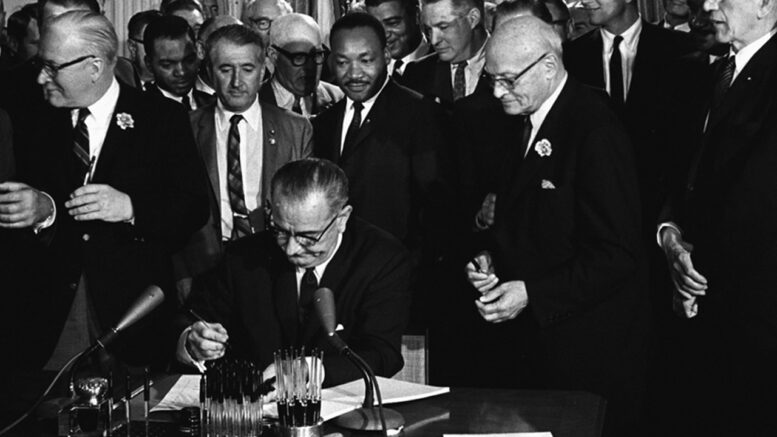July 2, 2024, marks the 60th anniversary of the Civil Rights Act of 1964, a landmark piece of legislation that transformed American society. Signed into law by President Lyndon B. Johnson, this act was a decisive step in the struggle for racial equality, outlawing discrimination based on race, color, religion, sex, or national origin. It also ended segregation in public places and banned employment discrimination, marking a pivotal moment in the United States’ journey toward civil rights and social justice.
The Civil Rights Act was the culmination of years of activism and advocacy, led by a cadre of passionate leaders and organizations. Among these leaders, Dr. Martin Luther King Jr. stands as a towering figure. His leadership in the Southern Christian Leadership Conference (SCLC), his eloquence, and his unwavering commitment to nonviolent protest were instrumental in galvanizing public support for civil rights. Alongside him were other influential figures, such as Rosa Parks, whose refusal to give up her bus seat ignited the Montgomery Bus Boycott, and John Lewis, whose bravery during the Selma to Montgomery marches became a symbol of the movement’s resilience.
The legislation’s passage was not without fierce opposition and debate, both in Congress and across the country. Yet, through the perseverance of civil rights advocates and the moral leadership of individuals like President Johnson, the act was signed into law on July 2, 1964. It became a foundational legal pillar for promoting equality and dismantling institutional racism.
Over the past six decades, the United States has made significant strides in race relations, spurred in large part by the Civil Rights Act. The legislation has paved the way for additional protections, including the Voting Rights Act of 1965 and the Fair Housing Act of 1968. It has empowered generations to challenge discriminatory practices in various spheres, from the workplace to education and public accommodations. The act has also played a crucial role in the ongoing efforts to achieve gender equality, supporting women’s rights and combating workplace discrimination.
Despite these advances, the journey toward full equality and justice continues. In recent years, the United States has witnessed renewed calls for racial justice, particularly in response to high-profile incidents of police brutality and systemic racism. Movements like Black Lives Matter have brought attention to the enduring disparities and injustices faced by people of color. While the Civil Rights Act laid a strong foundation, it is clear that the work of ensuring equal rights for all is an ongoing process.
Today, the Civil Rights Act of 1964 remains a cornerstone of American civil rights law. It continues to be invoked in court cases and policy debates, serving as a critical tool for protecting individuals from discrimination. However, challenges persist, as debates over affirmative action, voting rights, and police reform demonstrate that the promise of equality is still being fully realized. Recent Supreme Court decisions and legislative actions have sometimes tested the boundaries of the act’s protections, underscoring the need for vigilance in safeguarding civil rights.
As the nation commemorates the 60th anniversary of the Civil Rights Act, it is a moment to honor the progress made and the sacrifices of those who fought for equality. It is also a time to recommit to the ongoing struggle for justice, recognizing that the spirit of the Civil Rights Movement endures in the continued pursuit of a more just and inclusive society. The legacy of the Civil Rights Act of 1964 is not just a historical milestone but a living testament to the enduring fight for civil rights in America.
4o

Be the first to comment on "Celebrating 60 Years of the Civil Rights Act of 1964: A Legacy of Equality and Progress"